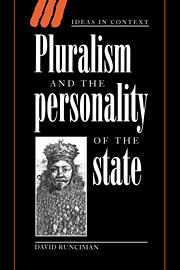Preface
Published online by Cambridge University Press: 10 November 2009
Summary
This book is about the political thought of seven men: Thomas Hobbes (1588–1679), Otto von Gierke (1841–1921), F. W. Maitland (1850–1906), J. N. Figgis (1866–1919), Ernest Barker (1874–1960), G. D. H. Cole (1889–1959) and Harold Laski (1893–1950). Hobbes was and is the greatest of all English political philosophers; he is also one of the supreme prose stylists in the English language. Gierke was one of the dominant figures in late nineteenth- and early twentiethcentury German life and thought; a jurist, philosopher and legal reformer, he was also an intellectual historian of genius. The same is true of Maitland, the founding father of legal history in England; like Gierke, he is one of the few historians whose works are still being read by other historians over a hundred years after they were written. Figgis was a follower of Maitland, and though his work has lasted slightly less well, it too has retained a readership, both among political theorists and historians. Barker, who was a political theorist and historian himself, achieved greater prominence in his own lifetime than did either Maitland or Figgis, rising to a professorship and a knighthood; his stock, however, has fallen considerably faster, and he is now something of a marginal figure in the intellectual history of this century (though a recent study in this series has attempted to reverse this trend).
Information
- Type
- Chapter
- Information
- Pluralism and the Personality of the State , pp. xi - xivPublisher: Cambridge University PressPrint publication year: 1997
